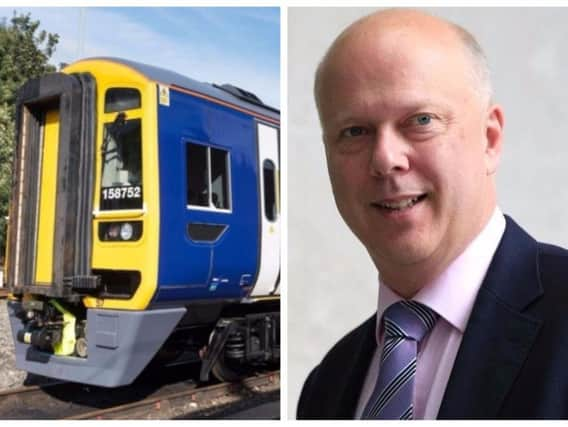'North is left with worst of all worlds over transport'


The ‘Northern Powerhouse’, he argued, is getting “unprecedented investment” in transport of £13bn over this Parliament – “the largest in Government history”.
Advertisement
Hide AdAdvertisement
Hide AdIn order to secure more improvements, he said it was up to the North ourselves to take the driving seat.
To do this, he promised that Transport for the North (TfN), a ‘powerful’ new body, would be backed by the powers enjoyed by Transport for London, and drive forward new investment – alongside elected metro-mayors.
Sadly, these promises crumble under scrutiny. Revelations continue to expose an inconvenient truth: however measured, the North gets a raw deal on transport investment.
The North’s population is twice the size of London, yet the £13bn he boasts for the three Northern regions is smaller than the price tag for a single project in the capital: Crossrail 1 (£14.8bn). Crossrail 2 – which the Transport Secretary happily backed on July 24, only days after tearing up plans for northern investment – boasts a cost that dwarfs it further: £31.2bn.
Advertisement
Hide AdAdvertisement
Hide AdThe gap in transport investment between London and other regions has widened over the past two years. In 2015, the UK spent £2.59 per head on London transport for every £1 spent in the North. In 2016, this figure was projected to rise to £4.55. As the thinktank IPPR North has highlighted, if the North had received the same per-person infrastructure investment as London, we would have received an extra £59 billion over the past decade.
It is easy to see this stark disparity playing out across Northern England. In a written statement to the Commons on July 20, the Transport Secretary scrapped plans to electrify the Oxenholme-Windermere lines, and said he would no longer electrify the line north of Kettering to Sheffield and Nottingham.
A day later, Grayling made an unofficial statement to the Press casting doubt on the entire TransPennine electrification project. Privately financed plans to electrify the Hull to Selby line had already been blocked by Ministers in November 2016.
We are now told that ‘new’ bi-modal diesel-electric train technology will help Northern commuters get “all” the benefits of electrification. However, this hybrid technology has existed for decades, including the years since 2010 when Ministers have been promoting the benefits of rail electrification.
Advertisement
Hide AdAdvertisement
Hide AdThe evidence shows that scrapping rail electrification in favour of hybrid trains will mean 30 per cent more CO2, maintenance costs increasing by a third and fuel costs rocketing 25 per cent. It will mean 30-minute longer journeys between Manchester-Liverpool, and 20-minute longer waits to get from Leeds Newcastle. No rail network that is not fully electrified merits the prefix ‘high speed’.
A similar shadow of uncertainty has been cast over many of the Northern road investment projects. The coalition Government promised us unprecedented levels of highways investment, with Highways England’s 2015-2020 Road Investment Strategy promising to invest in 43 northern projects.
Yet in March, the National Audit Office poured scorn over the hasty way they had been put together. “In order to meet the current challenges, the Department and Highways England will need to consider delaying or cancelling some of the projects,” they said. In Hull, Highways England’s planned improvement to the A63 in Castle Street has been delayed to 2020.
I agree with the Transport Secretary that the North can, and should, take the lead in driving through our own investment. Transport for the North (TfN) needs the same powers as Transport for London (TfL). But he has not given TfN anything near the same powers as TfL.
Advertisement
Hide AdAdvertisement
Hide AdDraft legislation shows TfN will only be able to “advise” Grayling on northern projects. It will not have the powers to borrow money which TfL has.
In short, the Government has given the North the worst of all worlds: neither the money to fund our transport projects and lever in private investment; nor the power to raise funds and promote the North ourselves.
On Monday, alongside a cross-party group of MPs, I will lead a Commons debate on Transport in Northern England – giving recently announced Government plans the scrutiny they require.
For too long, while Ministers have prioritised the insatiable demands of those lobbying for continuing transport investment on a massive scale in London and the South East, Northern regions have been denied the infrastructural modernisation necessary to make our true potential contribution.
Advertisement
Hide AdAdvertisement
Hide AdDo Ministers really believe their arguments about the need to ‘rebalance the economy’ and regenerate economies and communities across the North? After all, it was these Ministers who coined the term ‘Northern Powerhouse’.
For all these reasons, it is time that the Transport Secretary was held accountable and forced to give our region’s tax-payers, fare-payers and businesses the fairer deal on transport investment that we need and deserve.
Diana Johnson is Labour MP for Hull North.
Read more: